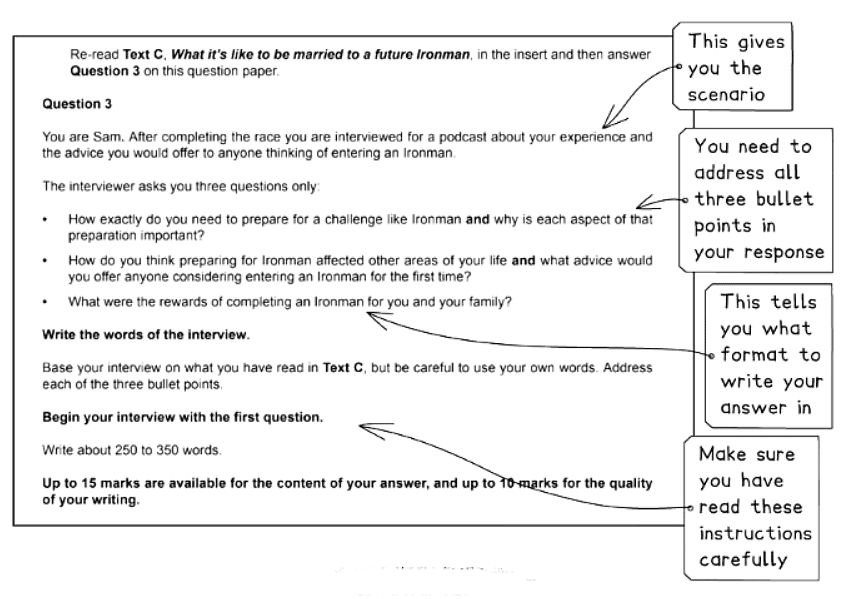Answering the Question 3: Extended Response | English Language for GCSE/IGCSE - Class 10 PDF Download
| Table of contents |

|
| How to Answer Question 3: Extended Response |

|
| Overview |

|
| Breaking down the question |

|
| Steps to success |

|
| Exam tips |

|
How to Answer Question 3: Extended Response
Paper 1: Reading is a mandatory examination in your IGCSE studies. CIE examiners suggest answering questions in the given order. By the time you tackle Question 3, you should be well-acquainted with Text C, the foundation for this question.
Below is a comprehensive guide to help you respond to Question 3: Extended Response effectively. It covers:
- Understanding the Question:
- Analyzing Text C:
- Structuring Your Response:
- Using Examples:
Overview
In this assignment, you will be tasked with creating a written composition following a specific format, drawing inspiration from the content of Text C. The prompt may require you to compose in one of six potential genres.
- A letter
- A report
- A journal entry
- A speech
- An interview
- An article
You are advised to write about 250 to 350 words, which means between one and one and a half sides of A4 in standard handwriting. There are 25 marks available for this extended response: up to 15 marks are available for the content of your answer, and up to 10 marks are available for the quality of your writing. You are being tested on both reading and writing assessment objectives.
- 15 marks:
- R1: demonstrate understanding of explicit meanings
- R2: demonstrate understanding of implicit meanings and attitudes
- R3: analyse, evaluate and develop facts, ideas and opinions, using appropriate support from the text
- 10 marks:
- W1: articulate experience and express what is thought, felt and imagined
- W2: organise and structure ideas and opinions for deliberate effect
- W3: use a range of vocabulary and sentence structures appropriate to context
- W4: use register appropriate to context
- W5: make accurate use of spelling, punctuation and grammar
- This means, in order to get the highest marks, you need to:
- Select appropriate ideas from the text
- Develop them relevantly, demonstrating your thorough evaluation and analysis of the text
- Support what you write with details from the text
- Write in an appropriate style and tone for the genre (format)
- Write a clear, well-sequenced and balanced response which covers the three areas of the question
- Write in your own words, sounding confident and consistent
Breaking down the question
For example (taken from the June 2022 exam paper):
Steps to success
Following these steps will provide you with a clear strategy for effectively answering the question:
- Start your answer with the first bullet point:
- Maintain your focus on the bullet point - avoid the temptation to write about everything or make up information not directly relevant to the bullet point
- Ensure you write in the format instructed:
- You can use the three bullet points as sub-headings, if appropriate
- Ensure you leave time to edit and correct your response
- Begin by addressing the initial bullet point to provide a clear start to your answer.
- Stay on track with the main point to avoid unnecessary details that stray from the topic.
- Follow the given format closely, especially when the question specifies a particular style like writing an interview.
- Consider using the three bullet points as section headings to organize your response effectively.
- Allocate ample time for reviewing and refining your answer for accuracy and clarity.
You are advised to spend no more than 40 minutes on this question (including reading time).
Exam tips
- Always base your answer on the ideas and details found in Text C:
- Ensure you reference Text C in your answer to avoid scoring low marks.
- Keep the intended audience and purpose of writing in mind:
- Maintain a consistent voice and style throughout your response.
- Avoid inventing additional information outside of Text C:
- Use clues and evidence from the text to make informed judgments.
- Give equal attention to each of the three bullet points.
- Use your own words to express ideas, avoid direct copying.
- Develop your ideas by explaining feelings or providing character viewpoints.
|
16 videos|45 docs
|
FAQs on Answering the Question 3: Extended Response - English Language for GCSE/IGCSE - Class 10
| 1. What are the symptoms of anxiety? |  |
| 2. How is anxiety diagnosed? |  |
| 3. What are some common treatment options for anxiety? |  |
| 4. Can anxiety be prevented? |  |
| 5. How common is anxiety in teenagers? |  |



















